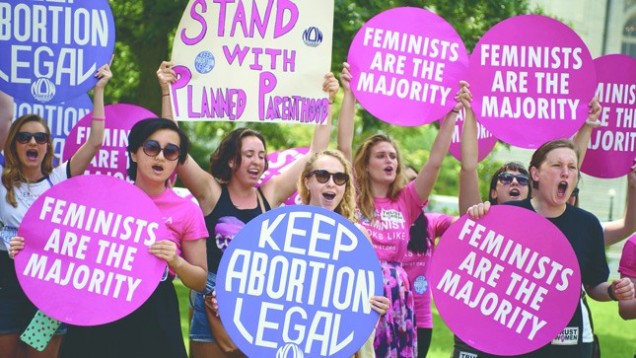By Sonam Bhagat
Planned Parenthood’s Terrible, Horrible, No-Good, Very Bad Year
The past 12 months was not the best of years for Planned Parenthood. In July 2015, a video surfaced of a Planned Parenthood employee discussing prices on harvested tissues from fetuses aborted by clinic patients. Planned Parenthood and other health care providers regularly act as a middleman – obtaining fetus tissue from consenting women and ensuring it safely reaches the proper research facilities. For this, the providers are usually reimbursed by research facilities for the costs of the process, but are not legally allowed to profit from the service.
Instantly the video caused an uproar within the GOP and prompted many political figures to point fingers at the organization for what it saw as illegal, greedy and immoral practices. Prominent Republican legislators, such as Ted Cruz, demanded that the organization be immediately stripped of over 500 million dollars in annual federal funding. During the Republican nomination process, Presidential hopefuls like Carly Fiorini used precious debate time to make wild accusations about the contents of the video and wilder claims that the “vast majority of Americans” support defunding Planned Parenthood.
Despite this misinformation, Planned Parenthood faced even more trouble when Congress took up the issue of the federal budget in September. The early fall saw Congress in a heated showdown, with Republicans fighting tooth and nail to attach an amendment to the budget that would defund Planned Parenthood as punishment for its “illegal” actions. On September 18, 2015, House Republicans were able to win the vote to defund the health care provider for one year. As the October 1st deadline to pass a federal budget approached, it was important that arguments over this bill not cause a repeat of the government shutdown of 2013. Fortunately, Senate Democrats worked hard to filibuster the amendment and the legislation failed to pass.
This small relief was short-lived however, as the organization faced a violent shooting at a Colorado branch in late November. The shooting has even caused some to speculate that the recent media scrutiny and criticism of the organization may have played a role in the attacker’s motivation to commit the act in the first place. Many of the conservative politicians lambasting Planned Parenthood seem to be attempting to ride the anti-abortion movement, claiming the organization provides solely abortion services in this country. To the contrary, the abortion services provided by Planned Parenthood accounted for only 3% of its services in 2013. And federal funding for abortion is restricted to cases of rape, incest or endangerment to the life of the mother by the Hyde Amendment.
Despite this, Senate Republicans passed the bill recently defunding Planned Parenthood and repealing parts of the Affordable Care Act. To do this, they relied on the Congressional reconciliation process, which only requires 51 votes to pass legislation. The bill passed 52-48.These votes are largely symbolic “political posturing” though, as President Obama has promised to veto any bill that touches the ACA or Planned Parenthood in any negative way.
Although the organization has faced a tough year, it has mobilized many supporters’ nationally, whether in person or through Facebook profile picture filters. The presidential election is bringing the debate into stark relief, with obvious pro-life and pro-choice platforms on either side. Trump has said that he plans to defund Planned Parenthood if they continue to perform abortions, although he actually supports the other services the organization provides. His choice in Mike Pence as a running mate speaks volumes as well. Pence has been working diligently since 2007 to defund Planned Parenthood, with some minor success. As the governor of Indiana, he has severely cut state funding to the organization. On the other hand, the 2016 Democratic National Convention hosted Planned Parenthood’s president Cecile Richards. Richards was clear in her speech when stating, “Make no mistake: women’s health and rights are on the line and on the ballot in this election.”
Hopefully the next 12 months will bring better tidings for an organization that aims (and is known) to provide affordable and essential health care services to thousands upon thousands of men, women, and children in low-income families in America – people who otherwise would not be able to receive proper health care at all. The presidential elections could be a death toll or a saving grace for an organization on the precipice. Come November, the future of Planned Parenthood will be more certain. Until then, the organization holds its breath.
 Sonam Bhagat is from Lowell, Massachusetts and graduated from Boston College in 2011, concentrating in Finance and Accounting. Sonam is expected to matriculate from Boston University School of Law in 2017. Sonam will be working for a large corporate law firm in the summer of 2016 and hopes to explore various areas of law, in order to better decide her course after graduation.
Sonam Bhagat is from Lowell, Massachusetts and graduated from Boston College in 2011, concentrating in Finance and Accounting. Sonam is expected to matriculate from Boston University School of Law in 2017. Sonam will be working for a large corporate law firm in the summer of 2016 and hopes to explore various areas of law, in order to better decide her course after graduation.
Loopholes in the System: How Student Loan Litigation May Change Going Forward
In June 2014, the Department of Education greatly reduced its funding from the for-profit institution Corinthian Colleges, which had received $1.4 billion in funding annually from the federal government. But serious concerns that Corinthian had mishandled the funds, redirecting them to creditors and other avenues rather than to students, led to multiple federal and state investigations. Finally, the DOE took action – it stopped giving the institution federal loans. In April 2015, cut off from these loans, Corinthian shut down the last of its campuses’ doors. Now, many Corinthian students are looking for help with the student loans they have been saddled with, and with nothing to show for it. The DOE, in June 2015, released on its website the two ways in which it plans to help students with loans related to their education at Corinthian. For students who were attending the closed down campuses, there is the option of loan forgiveness. The DOE is expanding the class of students eligible for loan forgiveness to include those who attended the school as far back as June 2014.
More strikingly, the DOE is making an unprecedented move in extending a loan forgiveness option for  students under the “defense to repayment”. Defense to repayment claims are usually brought under state UDAP laws – Unfair and Deceptive Acts and Practices laws. These state level claims provide easier relief as they do not require proof of intent and reliance may be presume. However, this rule has yet to be enforced on a federal level – whether in the Corinthian case or any other direct loan dispute. In the past 15 years, the Department received a grand total of five claims under the ‘defense to repayment’ provision of the law. This is partly because, when the rule was promulgated there was no guidance on the procedures for filing, disputing and resolving a claim under defense to repayment. In December 2014, 12 U.S. senators, led by Elizabeth Warren submitted a letter to the Department of Education asking for clarification on defense to repayment. In response, the DOE is attempting to make the process easier for thousands of Corinthian borrowers by putting in place an application procedure.
students under the “defense to repayment”. Defense to repayment claims are usually brought under state UDAP laws – Unfair and Deceptive Acts and Practices laws. These state level claims provide easier relief as they do not require proof of intent and reliance may be presume. However, this rule has yet to be enforced on a federal level – whether in the Corinthian case or any other direct loan dispute. In the past 15 years, the Department received a grand total of five claims under the ‘defense to repayment’ provision of the law. This is partly because, when the rule was promulgated there was no guidance on the procedures for filing, disputing and resolving a claim under defense to repayment. In December 2014, 12 U.S. senators, led by Elizabeth Warren submitted a letter to the Department of Education asking for clarification on defense to repayment. In response, the DOE is attempting to make the process easier for thousands of Corinthian borrowers by putting in place an application procedure.
In another unprecedented move, the Consumer Financial Protection Bureau worked with a buyer of partial Corinthian campuses and the DOE to secure a settlement valued at $480 million in debt relief for private student loan borrowers who attended Corinthian at the time of closing. Students who have private loans are also reassured that strong arm tactics – such as harassing calls and lawsuits – will not be used against them to collect on loans. These students will also have negative credit history erased from their credit reports. A broader lawsuit is currently still pending against Corinthian alleging predatory techniques were used to induce students to take out private loans.
There may be sufficient reason to invoke the “defense against repayment” option in the case of Corinthian colleges. But this may open the floodgates to other claims, especially in the for-profit education industry, that could fall under the defense. As the issue of burgeoning student loans in the millennial generation becomes a larger issue for the economy, this tiny loophole could create huge impacts in the coming years. More and more disgruntled students taking action may mean this “defense to repayment” could be extended to private, non-federal loans and public universities.
Recently, Obama’s administration has considering new rules and regulations allowing for easier debt relief. Several advocate groups have written to the DOE to make suggestions and provide guidance and encouragement in creating a clearer debt relief process. But the recent downfall of multiple for-profit educational institutions like Corinthian seems more a symptom of a toxic and unsustainable system stemming from overreliance on student loans; a system that forces the students to carry the burden for access to education. Relying on a short-term, half-formed relief strategy such as a “defense to repayment,” may just be akin putting a Band-Aid on a fatal wound.
 Sonam Bhagat is from Lowell, Massachusetts and graduated from Boston College in 2011, concentrating in Finance and Accounting. Sonam is expected to matriculate from Boston University School of Law in 2017. Sonam will be working for a large corporate law firm in the summer of 2016 and hopes to explore various areas of law, in order to better decide her course after graduation.
Sonam Bhagat is from Lowell, Massachusetts and graduated from Boston College in 2011, concentrating in Finance and Accounting. Sonam is expected to matriculate from Boston University School of Law in 2017. Sonam will be working for a large corporate law firm in the summer of 2016 and hopes to explore various areas of law, in order to better decide her course after graduation.

